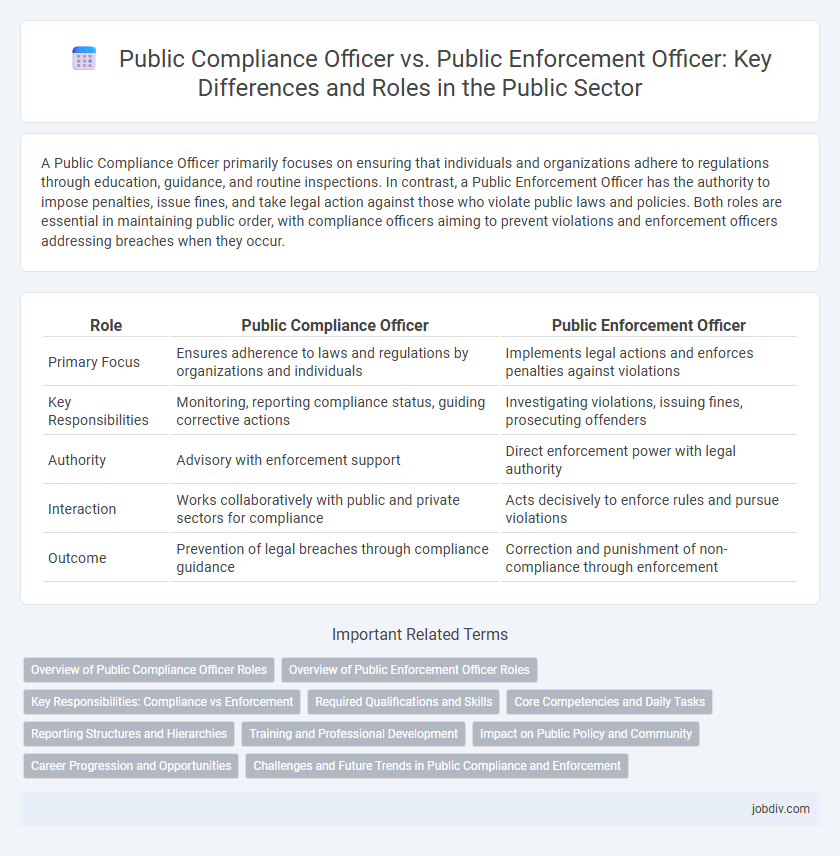A Public Compliance Officer primarily focuses on ensuring that individuals and organizations adhere to regulations through education, guidance, and routine inspections. In contrast, a Public Enforcement Officer has the authority to impose penalties, issue fines, and take legal action against those who violate public laws and policies. Both roles are essential in maintaining public order, with compliance officers aiming to prevent violations and enforcement officers addressing breaches when they occur.
Table of Comparison
| Role | Public Compliance Officer | Public Enforcement Officer |
|---|---|---|
| Primary Focus | Ensures adherence to laws and regulations by organizations and individuals | Implements legal actions and enforces penalties against violations |
| Key Responsibilities | Monitoring, reporting compliance status, guiding corrective actions | Investigating violations, issuing fines, prosecuting offenders |
| Authority | Advisory with enforcement support | Direct enforcement power with legal authority |
| Interaction | Works collaboratively with public and private sectors for compliance | Acts decisively to enforce rules and pursue violations |
| Outcome | Prevention of legal breaches through compliance guidance | Correction and punishment of non-compliance through enforcement |
Overview of Public Compliance Officer Roles
Public Compliance Officers primarily monitor adherence to regulations by conducting audits, inspections, and investigations within public sectors. They ensure organizational practices align with legal standards, promote ethical behavior, and provide guidance to prevent violations. Their role contrasts with Public Enforcement Officers, who focus on applying legal actions and penalties against non-compliant entities.
Overview of Public Enforcement Officer Roles
Public Enforcement Officers are responsible for ensuring adherence to laws and regulations within public sectors by monitoring compliance activities, conducting investigations, and applying penalties when necessary. They play a critical role in enforcing public policies related to health, safety, environmental standards, and regulatory frameworks. Their functions often include collaborating with other governmental agencies to maintain accountability and protect public interest.
Key Responsibilities: Compliance vs Enforcement
A Public Compliance Officer primarily ensures adherence to laws, regulations, and organizational policies by conducting audits, providing guidance, and implementing compliance programs. In contrast, a Public Enforcement Officer focuses on investigating violations, enforcing legal actions, and ensuring accountability through penalties and corrective measures. Both roles are essential for maintaining regulatory integrity but differ in their approach to managing public sector compliance and enforcement.
Required Qualifications and Skills
Public Compliance Officers typically require a background in regulatory frameworks, strong analytical skills, and expertise in risk assessment to ensure organizational adherence to laws and policies. Public Enforcement Officers need comprehensive knowledge of legal procedures, effective communication abilities, and investigative skills to enforce regulations and manage violations. Both roles demand proficiency in interpreting legislation and maintaining ethical standards, but Compliance Officers focus more on prevention, while Enforcement Officers prioritize corrective actions.
Core Competencies and Daily Tasks
Public Compliance Officers specialize in monitoring adherence to regulations through routine inspections, policy analysis, and stakeholder communication, ensuring organizational alignment with legal standards. Public Enforcement Officers concentrate on investigating violations, executing enforcement actions, and managing legal proceedings to uphold public safety and regulatory compliance. Core competencies for Compliance Officers include risk assessment, regulatory knowledge, and preventive measures, while Enforcement Officers prioritize investigative skills, legal expertise, and enforcement tactics.
Reporting Structures and Hierarchies
Public Compliance Officers typically report to compliance managers or internal regulatory bodies within their organization, focusing on ensuring adherence to laws and policies. Public Enforcement Officers usually operate under government agencies or law enforcement hierarchies, reporting to supervisors responsible for legal enforcement and public safety. The reporting structure for Compliance Officers emphasizes internal oversight, while Enforcement Officers follow formal external chain-of-command protocols.
Training and Professional Development
Public Compliance Officers undergo specialized training focused on regulatory standards, risk assessment, and community engagement to ensure adherence to public policies. Public Enforcement Officers receive advanced professional development in investigative techniques, legal procedures, and enforcement protocols to effectively address violations and uphold public safety. Both roles require continuous education to stay updated with evolving laws and regulatory frameworks.
Impact on Public Policy and Community
Public Compliance Officers primarily focus on ensuring adherence to regulations through education and collaboration, fostering a cooperative relationship between authorities and the community that promotes proactive public policy development. Public Enforcement Officers directly enforce laws and regulations, often through inspections and penalties, which can lead to swift behavioral changes and reinforce the authority of public policies. The combined efforts of both roles enhance community trust and contribute significantly to the effectiveness and evolution of public policy frameworks.
Career Progression and Opportunities
Public Compliance Officers typically begin their careers ensuring organizations adhere to regulatory standards, with opportunities to advance into senior compliance management or specialized legal advisory roles. Public Enforcement Officers focus on investigating and enforcing laws, often progressing towards leadership positions within regulatory agencies or criminal prosecution units. Career growth in both fields depends on gaining expertise in regulatory frameworks, developing investigative skills, and obtaining relevant certifications or advanced degrees in law or public administration.
Challenges and Future Trends in Public Compliance and Enforcement
Public Compliance Officers face challenges including navigating complex regulatory frameworks and ensuring organizational adherence to evolving policies, while Public Enforcement Officers confront difficulties in applying sanctions and managing public perception during enforcement actions. Both roles are increasingly leveraging advanced technologies such as AI-driven analytics and automated monitoring systems to identify non-compliance patterns and improve enforcement effectiveness. Future trends highlight the integration of predictive compliance tools and cross-agency collaboration to enhance transparency, accountability, and proactive risk management in public regulatory environments.
Public Compliance Officer vs Public Enforcement Officer Infographic

 jobdiv.com
jobdiv.com